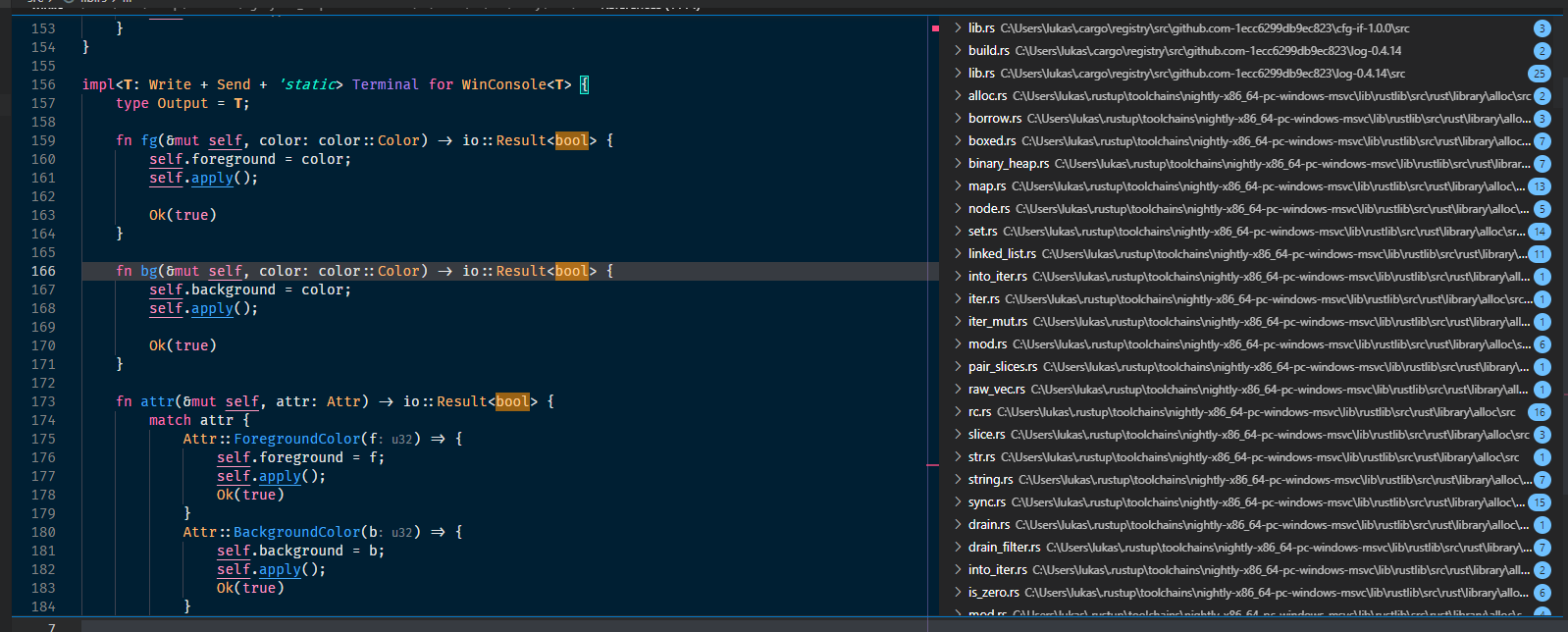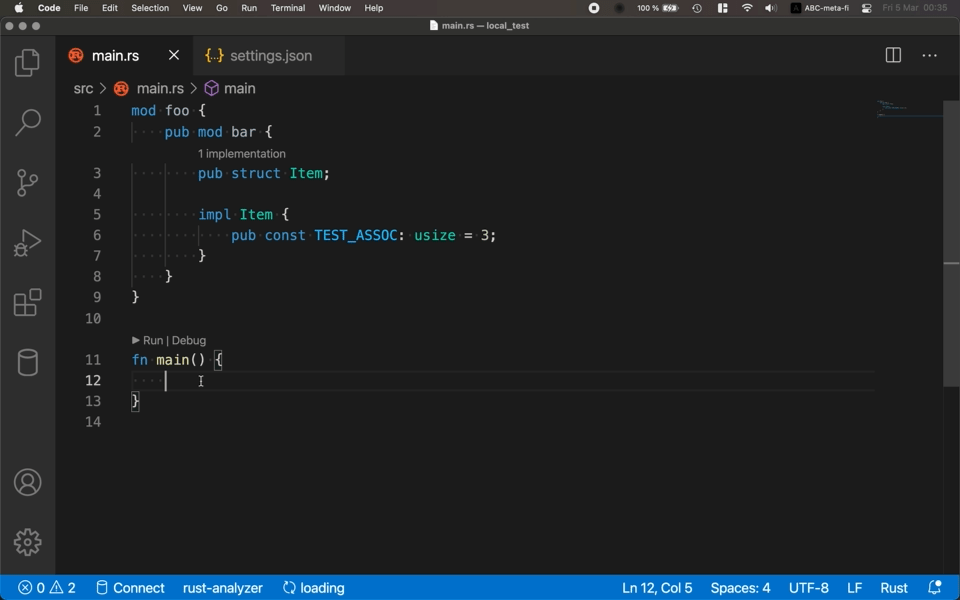Conceptually, using a *message* here is wrong, because this is a
"status", rather than "point in time" thing. But statuses are an LSP
extension, while messages are stable. As a compromise, send message only
for more critical `metadata` failures, and only once per state change.
8410: Use CompletionTextEdit::InsertAndReplace if supported by the client r=Veykril a=Veykril
Fixes#8404, Fixes#3130
Co-authored-by: Lukas Wirth <lukastw97@gmail.com>
8375: feat: show errors from `cargo metadata` and initial `cargo check` in the status bar r=matklad a=matklad
bors r+
🤖
Co-authored-by: Aleksey Kladov <aleksey.kladov@gmail.com>
We have a CLI for benchmarking, but no one actually uses it it seems.
Let's try switching to "internal" benchmarks, implemented as rust tests.
They should be easier to "script" to automate tracking of perf
regressions.
8132: Add `'` to trigger_characters, allowing more direct lifetime completions r=Veykril a=Veykril
Fixes having to type a character after `'` to complete lifetimes and labels
Co-authored-by: Lukas Wirth <lukastw97@gmail.com>
8021: Enable searching for builtin types r=matklad a=Veykril
Not too sure how useful this is for reference search overall, but for completeness sake it should be there

Also enables document highlighting for them.
8022: some clippy::performance fixes r=matklad a=matthiaskrgr
use vec![] instead of Vec::new() + push()
avoid redundant clones
use chars instead of &str for single char patterns in ends_with() and starts_with()
allocate some Vecs with capacity to avoid unnecessary resizing
Co-authored-by: Lukas Wirth <lukastw97@gmail.com>
Co-authored-by: Matthias Krüger <matthias.krueger@famsik.de>
use vec![] instead of Vec::new() + push()
avoid redundant clones
use chars instead of &str for single char patterns in ends_with() and starts_with()
allocate some Vecs with capacity to avoid unneccessary resizing
7873: Consider unresolved qualifiers during flyimport r=matklad a=SomeoneToIgnore
Closes https://github.com/rust-analyzer/rust-analyzer/issues/7679
Takes unresolved qualifiers into account, providing better completions (or none, if the path is resolved or do not match).
Does not handle cases when both path qualifier and some trait has to be imported: there are many extra issues with those (such as overlapping imports, for instance) that will require large diffs to address.
Also does not do a fuzzy search on qualifier, that requires some adjustments in `import_map` for better queries and changes to the default replace range which also seems relatively big to include here.

7933: Improve compilation speed r=matklad a=matklad
bors r+
🤖
Co-authored-by: Kirill Bulatov <mail4score@gmail.com>
Co-authored-by: Aleksey Kladov <aleksey.kladov@gmail.com>
7891: Improve handling of rustc_private r=matklad a=DJMcNab
This PR changes how `rust-analyzer` handles `rustc_private`. In particular, packages now must opt-in to using `rustc_private` in `Cargo.toml`, by adding:
```toml
[package.metadata.rust-analyzer]
rustc_private=true
```
This means that depending on crates which also use `rustc_private` will be significantly improved, since their dependencies on the `rustc_private` crates will be resolved properly.
A similar approach could be used in #6714 to allow annotating that your package uses the `test` crate, although I have not yet handled that in this PR.
Additionally, we now only index the crates which are transitive dependencies of `rustc_driver` in the `rustcSource` directory. This should not cause any change in behaviour when using `rustcSource: "discover"`, as the source used then will only be a partial clone. However, if `rustcSource` pointing at a local checkout of rustc, this should significantly improve the memory usage and lower indexing time. This is because we avoids indexing all crates in `src/tools/`, which includes `rust-analyzer` itself.
Furthermore, we also prefer named dependencies over dependencies from `rustcSource`. This ensures that feature resolution for crates which are depended on by both `rustc` and your crate uses the correct set for analysing your crate.
See also [introductory zulip stream](https://rust-lang.zulipchat.com/#narrow/stream/185405-t-compiler.2Fwg-rls-2.2E0/topic/Fixed.20crate.20graphs.20and.20optional.20builtin.20crates/near/229086673)
I have tested this in [priroda](https://github.com/oli-obk/priroda/), and it provides a significant improvement to the development experience (once I give `miri` the required data in `Cargo.toml`)
Todo:
- [ ] Documentation
This is ready to review, and I will add documentation if this would be accepted (or if I get time to do so anyway)
Co-authored-by: Daniel McNab <36049421+DJMcNab@users.noreply.github.com>
7335: added region folding r=matklad a=LucianoBestia
Regions of code that you'd like to be folded can be wrapped with `// #region` and `// #endregion` line comments.
This is called "Region Folding". It is originally available for many languages in VSCode. But Rust-analyzer has its own folding function and this is missing.
With this Pull Request I am suggesting a simple solution.
The regions are a special kind of comments, so I added a bit of code in the comment folding function.
The regex to match are: `^\s*//\s*#?region\b` and `^\s*//\s*#?endregion\b`.
The number of space characters is not important. There is an optional # character. The line can end with a name of the region.
Example:
```rust
// 1. some normal comment
// region: test
// 2. some normal comment
calling_function(x,y);
// endregion: test
```
I added a test for this new functionality in `folding_ranges.rs`.
Please, take a look and comment.
I found that these exact regexes are already present in the file `language-configuration.json`, but I don't find a way to read this configuration. So my regex is hardcoded in the code.
7691: Suggest name in extract variable r=matklad a=cpud36
Generate better default name in extract variable assist as was mentioned in issue #1587
# Currently supported
(in order of declining precedence)
1. Expr is argument to a function; use corresponding parameter name
2. Expr is result of a function or method call; use this function/method's name
3. Use expr type name (if possible)
4. Fallback to `var_name` otherwise
# Showcase


# Questions
* Should we more aggressively strip known types? E.g. we already strip `&T -> T`; should we strip `Option<T> -> T`, `Result<T, E> -> T`, and others?
* Integers and floats use `var_name` by default. Should we introduce a name, like `i`, `f` etc?
* Can we return a list and suggest a name when renaming(like IntelliJ does)?
* Should we add counters to remove duplicate variables? E.g. `type`, `type1`, type2`, etc.
Co-authored-by: Luciano Bestia <LucianoBestia@gmail.com>
Co-authored-by: Luciano <31509965+LucianoBestia@users.noreply.github.com>
Co-authored-by: Vladyslav Katasonov <cpud47@gmail.com>